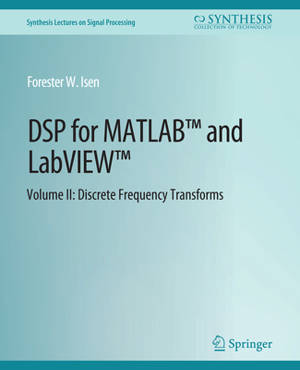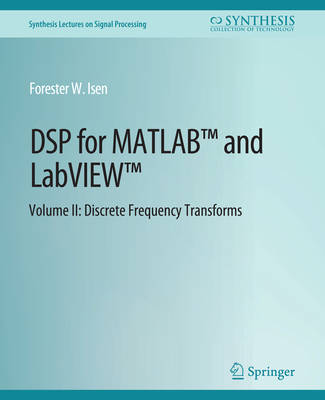
- Afhalen na 1 uur in een winkel met voorraad
- Gratis thuislevering in België vanaf € 30
- Ruim aanbod met 7 miljoen producten
- Afhalen na 1 uur in een winkel met voorraad
- Gratis thuislevering in België vanaf € 30
- Ruim aanbod met 7 miljoen producten
Zoeken
€ 52,95
+ 105 punten
Uitvoering
Omschrijving
This book is Volume II of the series DSP for MATLAB(TM) and LabVIEW(TM). This volume provides detailed coverage of discrete frequency transforms, including a brief overview of common frequency transforms, both discrete and continuous, followed by detailed treatments of the Discrete Time Fourier Transform (DTFT), the z -Transform (including definition and properties, the inverse z -transform, frequency response via z-transform, and alternate filter realization topologies (including Direct Form, Direct Form Transposed, Cascade Form, Parallel Form, and Lattice Form), and the Discrete Fourier Transform (DFT) (including Discrete Fourier Series, the DFT-IDFT pair, DFT of common signals, bin width, sampling duration and sample rate, the FFT, the Goertzel Algorithm, Linear, Periodic, and Circular convolution, DFT Leakage, and computation of the Inverse DFT). The entire series consists of four volumes that collectively cover basic digital signal processing in a practical and accessible manner, but which nonetheless include all essential foundation mathematics. As the series title implies, the scripts (of which there are more than 200) described in the text and supplied in code form here will run on both MATLAB(TM) and LabVIEW(TM). The text for all volumes contains many examples, and many useful computational scripts, augmented by demonstration scripts and LabVIEW(TM) Virtual Instruments (VIs) that can be run to illustrate various signal processing concepts graphically on the user's computer. Volume I consists of four chapters that collectively set forth a brief overview of the field of digital signal processing, useful signals and concepts (including convolution, recursion, difference equations, LTI systems, etc), conversion from the continuous to discrete domain and back (i.e., analog-to-digital and digital-to-analog conversion), aliasing, the Nyquist rate, normalized frequency, sample rate conversion and Mu-law compression, and signal processing principles including correlation, the correlation sequence, the Real DFT, correlation by convolution, matched filtering, simple FIR filters, and simple IIR filters. Chapter 4 of Volume I, in particular, provides an intuitive or ""first principle"" understanding of how digital filtering and frequency transforms work, preparing the reader for the present volume (Volume II). Volume III of the series covers digital filter design (FIR design using Windowing, Frequency Sampling, and Optimum Equiripple techniques, and Classical IIR design) and Volume IV, the culmination of the series, is an introductory treatment of LMS Adaptive Filtering and applications. Table of Contents: The Discrete Time Fourier Transform / The z-Transform / The DFT
Specificaties
Betrokkenen
- Auteur(s):
- Uitgeverij:
Inhoud
- Aantal bladzijden:
- 217
- Taal:
- Engels
- Reeks:
Eigenschappen
- Productcode (EAN):
- 9783031014017
- Verschijningsdatum:
- 15/12/2008
- Uitvoering:
- Paperback
- Formaat:
- Trade paperback (VS)
- Afmetingen:
- 191 mm x 235 mm
- Gewicht:
- 451 g

Alleen bij Standaard Boekhandel
+ 105 punten op je klantenkaart van Standaard Boekhandel
Beoordelingen
We publiceren alleen reviews die voldoen aan de voorwaarden voor reviews. Bekijk onze voorwaarden voor reviews.











